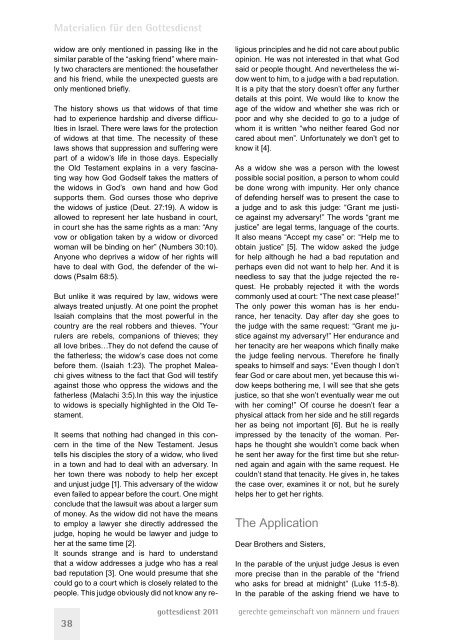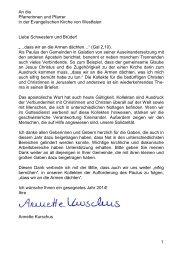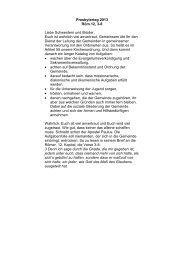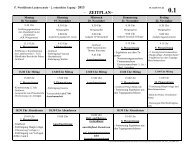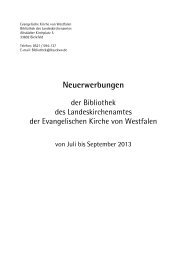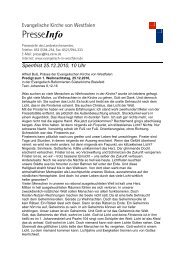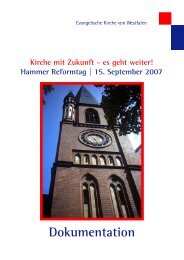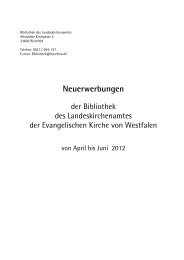West Papua - Evangelische Kirche von Westfalen
West Papua - Evangelische Kirche von Westfalen
West Papua - Evangelische Kirche von Westfalen
Sie wollen auch ein ePaper? Erhöhen Sie die Reichweite Ihrer Titel.
YUMPU macht aus Druck-PDFs automatisch weboptimierte ePaper, die Google liebt.
Materialien für den Gottesdienst<br />
widow are only mentioned in passing like in the<br />
similar parable of the “asking friend” where mainly<br />
two characters are mentioned: the housefather<br />
and his friend, while the unexpected guests are<br />
only mentioned briefly.<br />
The history shows us that widows of that time<br />
had to experience hardship and diverse difficulties<br />
in Israel. There were laws for the protection<br />
of widows at that time. The necessity of these<br />
laws shows that suppression and suffering were<br />
part of a widow’s life in those days. Especially<br />
the Old Testament explains in a very fascinating<br />
way how God Godself takes the matters of<br />
the widows in God’s own hand and how God<br />
supports them. God curses those who deprive<br />
the widows of justice (Deut. 27:19). A widow is<br />
allowed to represent her late husband in court,<br />
in court she has the same rights as a man: “Any<br />
vow or obligation taken by a widow or divorced<br />
woman will be binding on her” (Numbers 30:10).<br />
Anyone who deprives a widow of her rights will<br />
have to deal with God, the defender of the widows<br />
(Psalm 68:5).<br />
But unlike it was required by law, widows were<br />
always treated unjustly. At one point the prophet<br />
Isaiah complains that the most powerful in the<br />
country are the real robbers and thieves. ”Your<br />
rulers are rebels, companions of thieves; they<br />
all love bribes…They do not defend the cause of<br />
the fatherless; the widow’s case does not come<br />
before them. (Isaiah 1:23). The prophet Maleachi<br />
gives witness to the fact that God will testify<br />
against those who oppress the widows and the<br />
fatherless (Malachi 3:5).In this way the injustice<br />
to widows is specially highlighted in the Old Testament.<br />
It seems that nothing had changed in this concern<br />
in the time of the New Testament. Jesus<br />
tells his disciples the story of a widow, who lived<br />
in a town and had to deal with an adversary. In<br />
her town there was nobody to help her except<br />
and unjust judge [1]. This adversary of the widow<br />
even failed to appear before the court. One might<br />
conclude that the lawsuit was about a larger sum<br />
of money. As the widow did not have the means<br />
to employ a lawyer she directly addressed the<br />
judge, hoping he would be lawyer and judge to<br />
her at the same time [2].<br />
It sounds strange and is hard to understand<br />
that a widow addresses a judge who has a real<br />
bad reputation [3]. One would presume that she<br />
could go to a court which is closely related to the<br />
people. This judge obviously did not know any re-<br />
38<br />
gottesdienst 2011<br />
ligious principles and he did not care about public<br />
opinion. He was not interested in that what God<br />
said or people thought. And nevertheless the widow<br />
went to him, to a judge with a bad reputation.<br />
It is a pity that the story doesn’t offer any further<br />
details at this point. We would like to know the<br />
age of the widow and whether she was rich or<br />
poor and why she decided to go to a judge of<br />
whom it is written “who neither feared God nor<br />
cared about men”. Unfortunately we don’t get to<br />
know it [4].<br />
As a widow she was a person with the lowest<br />
possible social position, a person to whom could<br />
be done wrong with impunity. Her only chance<br />
of defending herself was to present the case to<br />
a judge and to ask this judge: “Grant me justice<br />
against my adversary!” The words “grant me<br />
justice” are legal terms, language of the courts.<br />
It also means “Accept my case” or: “Help me to<br />
obtain justice” [5]. The widow asked the judge<br />
for help although he had a bad reputation and<br />
perhaps even did not want to help her. And it is<br />
needless to say that the judge rejected the request.<br />
He probably rejected it with the words<br />
commonly used at court: “The next case please!”<br />
The only power this woman has is her endurance,<br />
her tenacity. Day after day she goes to<br />
the judge with the same request: “Grant me justice<br />
against my adversary!” Her endurance and<br />
her tenacity are her weapons which finally make<br />
the judge feeling nervous. Therefore he finally<br />
speaks to himself and says: “Even though I don’t<br />
fear God or care about men, yet because this widow<br />
keeps bothering me, I will see that she gets<br />
justice, so that she won’t eventually wear me out<br />
with her coming!” Of course he doesn’t fear a<br />
physical attack from her side and he still regards<br />
her as being not important [6]. But he is really<br />
impressed by the tenacity of the woman. Perhaps<br />
he thought she wouldn’t come back when<br />
he sent her away for the first time but she returned<br />
again and again with the same request. He<br />
couldn’t stand that tenacity. He gives in, he takes<br />
the case over, examines it or not, but he surely<br />
helps her to get her rights.<br />
The Application<br />
Dear Brothers and Sisters,<br />
In the parable of the unjust judge Jesus is even<br />
more precise than in the parable of the “friend<br />
who asks for bread at midnight” (Luke 11:5-8).<br />
In the parable of the asking friend we have to<br />
gerechte gemeinschaft <strong>von</strong> männern und frauen


